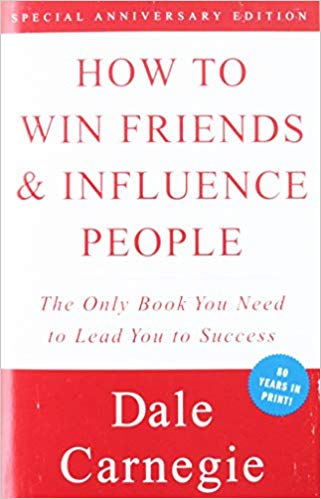The author identifies a few fundamental things that will help one win friends and influence people easily. Most people don’t respond very well to
The author identifies a few fundamental things that will help one win friends and influence people easily.
- Most people don’t respond very well to criticism, condemnation, or complaint, so if you’re feeling such things about someone, just bite your tongue and hold back. By doing this, you avoid adding unnecessary negativity to a conversation, negativity that can very easily backfire on you by making others think less of you.
- Speak positively of others every chance you get. Think of a few positive things to say about each person you know and then reference those positive attributes when you can.
- Make the other person interested in you by leading with the things that are useful to them. Take a cover letter, for example; don’t lead with “I want this job,” but instead with something stating your best characteristic for that job.
- A simple way to make a good first impression is to smile.
- Try to be good with names. If you are unable to put a name to a face, practice strategies that can help you recall facts about people by name without any trouble.
- Become a good conversationalist by genuinely listening to others.
- Show interest in people. The key technique here is to translate what you hear into talking about what interests the person you’re speaking to. Listen for things that they are interested in that you know something about, and then follow that point as a train of conversation – don’t just interject your current passions into the discussion, because they might not be shared.
- If you want to build a real bond with someone else, make it clear how important that person is to you and do it in a way that the sincerity of the feeling comes across.
- Avoid arguments. If something looks like it might be turning into one, just let it drop as gracefully as you can and move on. Doing this over and over again will make you appear levelheaded and rational.
- The easiest way to make an enemy is to tell them that they are wrong. Instead of doing that, say something like, “I never thought of it that way before” and ask questions, whether or not you feel the position has merit or not.
- Admit It if you are wrong and be very clear about the admission. Don’t try to hide it under sulking or arrogance, because you’ll just amplify the negativity of those behaviors when you’ve clearly been exposed as being wrong.
- Often, you have to enter conversations where you’re going to have to deliver some bad news or a negative report. You can make this go much easier by starting off with the positives. For example, if you have terrible service at an otherwise good restaurant, don’t shout at the manager about it – tell him the things you did like first, then point out that some service problems may be tarnishing the reputation of the restaurant. This actually works really well for making the conversation go well and it has earned me a few vouchers, too.
- If you’re trying to convince someone of your argument, start off with base points that you’re absolutely sure they will agree with and ask them to acknowledge that agreement. Then, when you move from step to step, keep getting those positive acknowledgements. A string of “yes”es is more likely to yield another “yes.”
- When someone comes to you to complain about something, don’t interject and start an argument. Let them blow off their steam and only respond when they’re finished. Ask questions to encourage them to speak even more. This will often cause them to vent off most or all of their issue, which makes it much easier for the problem to be handled rationally at the end of the conversation.
- To get cooperation, lead people to the conclusion of the argument. Present all of the ideas up front, then state your conclusion and ask for their approval on it with a nice “What do you think?” Listen to what they have to say and then try to incorporate it. In the end, they will feel like the idea is theirs and will come out of the conversation feeling quite positive about things. This is a great way to get a supervisor to incorporate a change in the workplace.
- If you just don’t understand where someone is coming from, spend a bit of time trying to put yourself in that person’s shoes. Why would this person feel this way about the situation? Usually, putting yourself in their shoes for a while will reveal a few things that weren’t entirely clear to you before and might just lead directly to a healthy understanding and solution to the problem at hand.
- Inevitably, someone will come to you with an untenable idea or desire that you simply can’t approve of. In that case, at least show approval of the feelings and thoughts that brought the suggestion to bear.
- Regardless of whether or not you feel a claim is legitimate or not, respond to it with sincerity by appealing to fundamental societal ideas of right and wrong and fair play. Frame your response in such a way that the person’s fundamental sense of right and wrong is put into play when they hear what you have to say.
